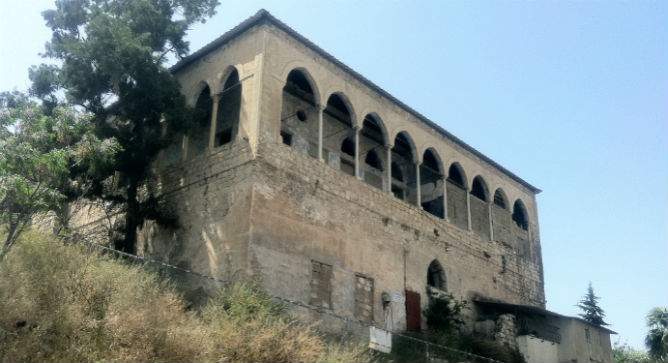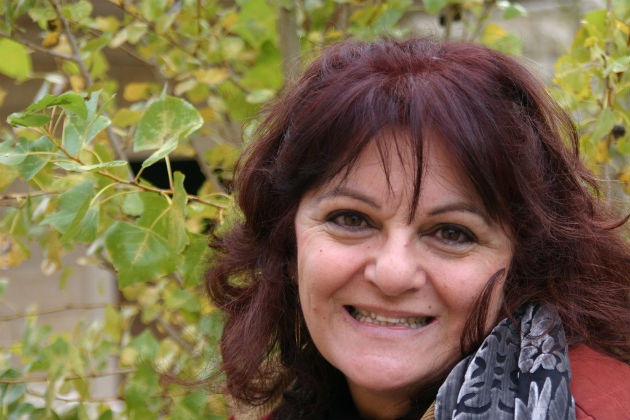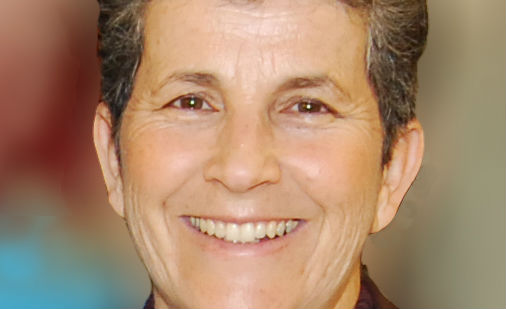An empty 200-year-old sheikh’s palace in Haifa will be transformed into the Museum of Israeli Women – just as soon as its founder, Yael Nitzan, can raise $6 million.
Nitzan, a feminist TV producer, art historian and author, has planned this museum for decades. Though Israel reportedly has the world’s highest ratio of museums per person, none is dedicated to the mostly unsung females responsible for weaving together its social, agricultural and business fabric.
Now that her dream has taken a giant step to fruition thanks to the Haifa municipality’s gift of a building, her excitement bubbles over: “I am so full of the stories of what women did in Israel!” she tells ISRAEL21c.
Most of the 40 women on her initial list are less well-known than Golda Meir, Israel’s first and only female prime minister – though Meir is certainly included.
“Golda Meir brought $100 million to Israel — $50 million at beginning of the War of Independence and $50 million after. [David] Ben-Gurion asked her to go to America, and she gathered small groups of women in every town to solicit funds. So actually, women built Israel,” Nitzan states.
Spread the Word
• Email this article to friends or colleagues
• Share this article on Facebook or Twitter
• Write about and link to this article on your blog
• Local relevancy? Send this article to your local press
Some 4,000 women served in the Jewish Brigade of the British army, including Sonia Peres, the late wife of Israeli President Shimon Peres. “Five women from this corps became founders of the women’s division of the Israeli army,” says the former IDF captain.
Over the past few years, Nitzan has gleaned ideas from women’s museums in Denmark and New York, and from a traveling exhibition on innovative women in the United States.
Museums dedicated to women aren’t the norm, even in larger and older countries. But that doesn’t faze Nitzan.
“There’s nothing quite like Israel in the world and nothing quite like the women of Israel,” she says.
Notable Israeli women
Several years ago, a friend invited Nitzan to a lecture by Israeli historian Esther Carmel-Hakim, a foremost expert on the women of Israel.
Carmel-Hakim did her PhD dissertation on Hannah Maisel (1183-1972), one of the eight personalities whose biographies she penned for the online Jewish Women’s Encyclopedia.
Maisel, with a doctorate in agriculture, came to Palestine from Europe to establish farms and agricultural schools for women between 1911 and 1926. She got donations from women in Switzerland and Germany. Maisel helped found the Women’s International Zionist Organization (WIZO) with Rivka Ziv (Rebecca Sieff), who also established what was later renamed the Weizmann Institute of Science.
Ziv is on Nitzan’s list, as is Rachel Yanait Ben-Zvi, “the second most important woman in Israel after Hannah Maisel. She taught women in Jerusalem how to milk cows, grow vegetables and make cheese. Because of her, the women were able to make their own food so their husbands could go out and build the state.”
Bringing women into the collective memory
Carmel-Hakim is helping Nitzan choose the women for the exhibits.
However, she tells ISRAEL21c, “My vision is to publicize the contribution of women to Israel by exposing them in every museum, not just one.”
She takes students in her “Women in Israel” class at the University of Haifa International School to the Rishon Lezion Museum, where they learn about notable immigrants such as the country’s first female kindergarten teacher, Esther Shapira. She also takes them to the Ayalon Institute near Rehovot, where women helped make bullets in a secret underground factory for the War of Independence.
“I’m trying to put Shulamit Goldstein, the first female pilot, in the Air Force Museum,” Carmel-Hakim says. This 1914 Ukrainian immigrant learned to fly in a course in Egypt. Later on she joined a work brigade at Rosh Pinah, taught nursery school (future Prime Minister Ehud Olmert was among her pupils), ran a poultry farm and manufactured fiberglass.
In the 1930s, more than 20 percent of the physicians in Palestine were female, says Carmel-Hakim, and female dentists outnumbered male dentists.
Among the others Carmel-Hakim suggests for the future museum are Israel’s original First Lady Vera Weizmann, a physician who helped in the rehabilitation of those injured in the War of Independence, raised funds to establish the Tel Hashomer Hospital, and worked on behalf of Youth Aliyah; and Dorothy Bar-Adon, a New Jersey journalist who joined the staff of the Palestine (now Jerusalem) Post in 1933.
“I will help Yael in any way I can to bring women into our collective memory and educational system,” she pledges.
Celebrating women’s contributions
Nitzan, who curated a Haifa exhibition of 50 female artists to mark International Women’s Day last March 8, says her personal archives on Israeli women will be installed in the future museum.
She hopes to serve as the museum’s director. “I think in two years we can finish it,” she says with the confidence of a woman who produced about 45 films and 100 TV shows over a 25-year span.
“We want to do an annual convention about women, and we want to give a prize. Only 10% of Israel Prize winners have been women, yet about 80% of Israel’s artists are women.”
The Museum of Israeli Women will include a memorial to the hundreds of female soldiers who fell during their military service, and Nitzan envisions hosting courses for female officers there.
Keren Haifa, the Haifa Foundation, is accepting donations. US donors may contact Nomi Seidenwerg (seidenwerg@sbcglobal.net) on the West Coast, and Barry Boxer (boxerBJB62@aol.com) on the East Coast.
















